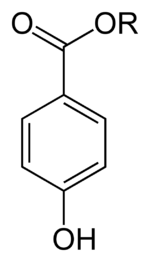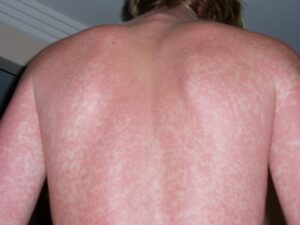
Source: Wikipedia
What are Parabens?
Parabens are preservatives used in cosmetics, toiletries, and other personal care products to prevent bacterial growth and thus increase product longevity. The group of “paraben” chemicals are similar in that they all contain the base “paraben” molecule but each has different numbers of carbon and hydrogen atoms joined to one branch of the base molecule. As an allergen, they often cross-react, as usually more than one paraben is used in each product. Allergy to parabens is uncommon compared to how many people use these chemicals safely on a daily basis.
Why are Parabens of Concern?
For most people, parabens pose no immediate danger, which is good because they are in a lot of products. Parabens are considered nontoxic, but can weakly act similarly to the hormone estrogen, bonding with cells in our bodies and preventing proper hormonal function. There are some possible concerns for risk of breast cancer because of this, but tests to this point have shown that levels exponentially higher than used in any one single application have an exponentially lower impact than the estrogen from birth control pills. Because testing to this point has focused on a single paraben in a single product, and parabens are used in combination with one another in a great number of products in our environment, no definitive conclusions about society’s current paraben use can yet be drawn, either for or against their use. There is evidence that butylparaben can react with UVB rays and leave skin more susceptible to sun damage.
For the allergic, parabens pose an additional hazard; they can cause rashes or cause existing rashes to worsen. Repeated contact with low concentrations of parabens over an extended period of time may cause sensitivity to develop; this means that parabens are sensitizers. Usually an allergen patch test will test the skin for reaction to mixtures of parabens to provide greater accuracy.
 What are the Symptoms of Paraben Allergy?
What are the Symptoms of Paraben Allergy?
Reactions to parabens include rashes in places where paraben-containing products are used or rinsed over the body, and worsening of existing rashes. Paraben allergy on the face could manifest as swollen or itchy eyes as well as rashes and itchiness. The first step in clearing up symptoms is avoidance. Once the allergen is removed, the symptoms are best treated with paraben-free topical medications appropriate to the location of the reaction, as prescribed by a doctor. Although allergy to internally ingested parabens is rare, it is possible, and is less likely to be diagnosed without a specific testing request (you probably have a good reason if you suspect this to be the case). Most food reactions present as mouth-based or more severe anaphylactic symptoms.
In Which Products are Parabens Found?
-

Source: www.colgate.ca
Cosmetics in the form of facial powders, lotions, or creams, liners, mascara, eyeshadows, and lipstick
- Lotions and creams
- Makeup remover
- Nail polishes
- Topical medications
- Products applied to the skin like deodorants, cleansers, soaps, shampoos, conditioners, sunscreens, band aids, and body washes
- Toothpastes
- Eye, nose, and ear drops
- Internally-applied medications or treatments like hemorrhoid cream
- Local anaesthetics
- Foods such as salad dressings and other condiments, processed vegetables, preserves, baked goods, candies, frozen dairy products, and preserves
What are Other Names for Parabens?
- Methyl-parahydroxybenzoate
- Methylparaben
- Methyl-4-hydroxybenzoate
- Ethyl-parahydroxybenzoate
- Ethylparaben
- Ethyl-4-hydroxybenzoate
- Propyl-parahydroxybenzoate
- Propylparaben
- Propyl-4-hydroxybenzoate
- Butyl-parahydroxybenzoate
- Butylparaben
- Butyl-4-hydroxybenzoate
- Heptylparaben
- Benzyl-parahydroxybenzoate/Benzylparaben (less common)
- Isobutylparaben
If I Have a Paraben Allergy, Are There Any Other Chemicals I Might Need to Avoid?
People with paraben allergies could also be allergic to paraphenylenediamine and/or paba-aminobenzoic acid (PABA) esters.
